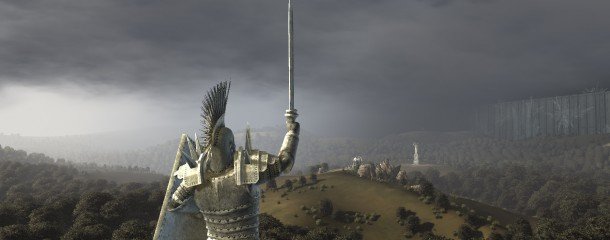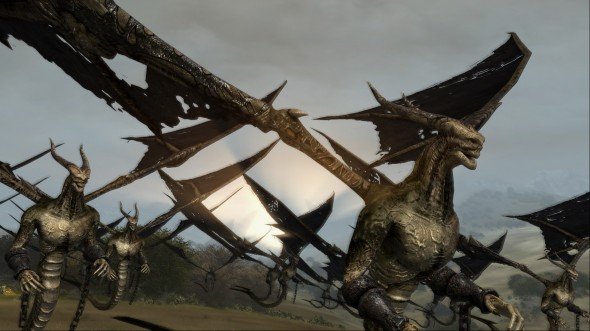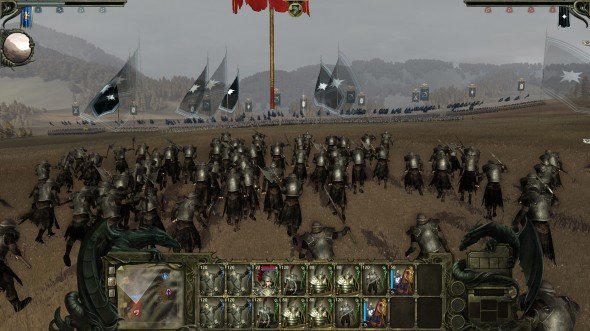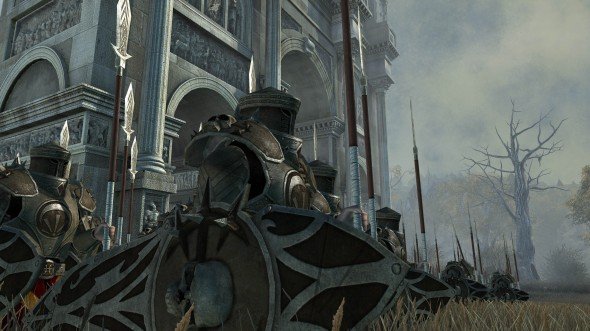King Arthur 2 preview

Scotland: a lawless, barren wasteland populated by giants and wolves… at least according to King Arthur 2. The game's 15-hour prologue campaign is set on England's northern border, and sees you uniting tribes of settled Roman soldiers to defend Hadrian's Wall against the hordes of savages that periodically attempt to cross it.
The first King Arthur was a game of great ideas that weren't fully realised. It fused Total War's combination of turn-based and real-time strategy with RPG-style characters, spells and quests. The second game isn't about changing that formula, it's about refining it. Neocore have paid careful attention to criticism of the first game, and at every stage they've fixed, improved, upgraded and expanded on what went before.
The monstrous units are a big part of King Arthur's appeal. Drawing on Celtic mythology to deploy an army of giants, wargs and fairy soldiers was one of the highlights of the first game, the sequel looks set to build on that.

I was facing off against entire armies of giants by my second battle, and while I didn't get to see the high-tier units in action, Neocore assured me that there were many more monsters to come. Included among them are flying units, which could potentially add an extra dimension to the classic archer/infantry/ cavalry system. Dragons!
Don't count out the humble humans though, especially when you can bring up to 4,000 of them to a fight. Your Knights, however – the upgradeable, spellcasting generals that lead your armies – remain your most potent weapon. Each one now has his own unique skill tree, full of abilities that can turn the tide of combat, or smash enemies apart with bolts of magical fire. For example, Septimus Sulla, my starting character in the prologue, had access to a tactically useful 'slow' spell, which turned even the most determined cavalry charge into a slow, sullen, shuffle. Another knight could sweep away several enemies with a mighty sword stroke, taking out whole units swiftly and efficiently.
Spells can be real game changers in King Arthur 2. In my first game I was too slow to capture the important victory locations, so my opponent, despite being outnumbered, managed to get my men bogged down with his heavy infantry, then pepper me with devastating lightning bolts.
By the second battle I was smarter: I quickly grabbed two shrines that boosted my magical resistance, meaning the enemy's spells just bounced off my troops as they rapidly closed in for the kill.
Keep up to date with the most important stories and the best deals, as picked by the PC Gamer team.

In the previous King Arthur, the player with the most victory locations would count down to victory. The idea was to force your army to be mobile, but it didn't quite work, instead meaning that fast cavalry or teleporting knights could win entire games without really fighting the enemy. Now the locations no longer contribute towards victory, but they do carry more potent spells, able to be used all over the battlefield, as I was unlucky enough to find out.
There's also more emphasis on other RPG elements, like loot. Magic items were common rewards in King Arthur, so much so that you often ended up with more than you needed. Now taking three surplus items to the artefact shop will let you forge them into a single, more powerful object.
Which items you use in the process will influence the end result, but there's a degree of randomisation. The whole process reminded me very much of Diablo II's Horadric Cube, and should add a welcome layer of customisation to the items in the game.
The artefact shop is also home to one of the game's more unusual innovations: they now act as a kind of 'cloud storage' for items. Anything be dropped off at one shop can then be picked up from any of the others, with a similar system for troops placed in castles. It might sound silly, but it's certainly better than having two armies take a six-month detour just so their generals can exchange trinkets.

Unlike most games that claim to offer 'RPG elements', King Arthur actually includes moments of narrative role play in addition to the numbers game. The quests from the first game – little 'choose your own adventure' moments where you decided how your Knight would deal with certain situations – are now bigger and more complex.
When I played, I had to win a debate in the Senate regarding my family duties. There were several layers and branches of conversation, resulting in something far deeper than the short and simple quests of the first game.
King Arthur 2 isn't going to reinvent the first game; it doesn't need to. It takes the strong ideas and setting of the first game and delivers them bigger, better, and more polished than ever before. Total War may finally have a real challenger

